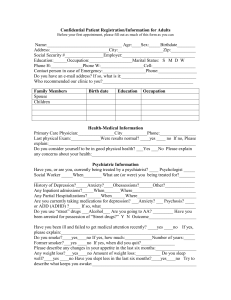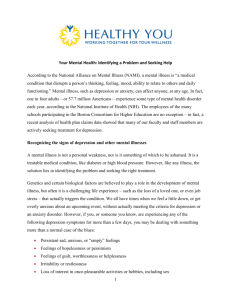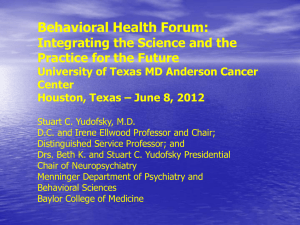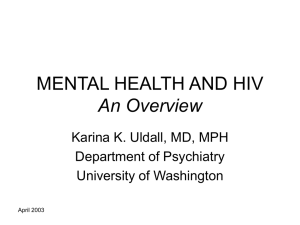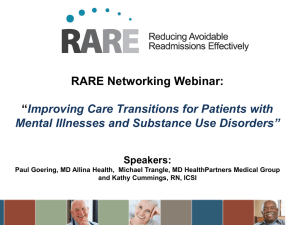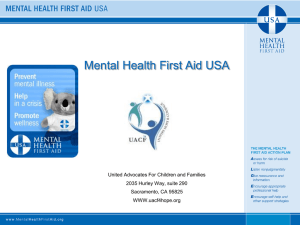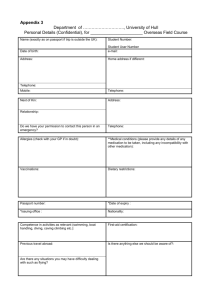So what about mental illness?
advertisement
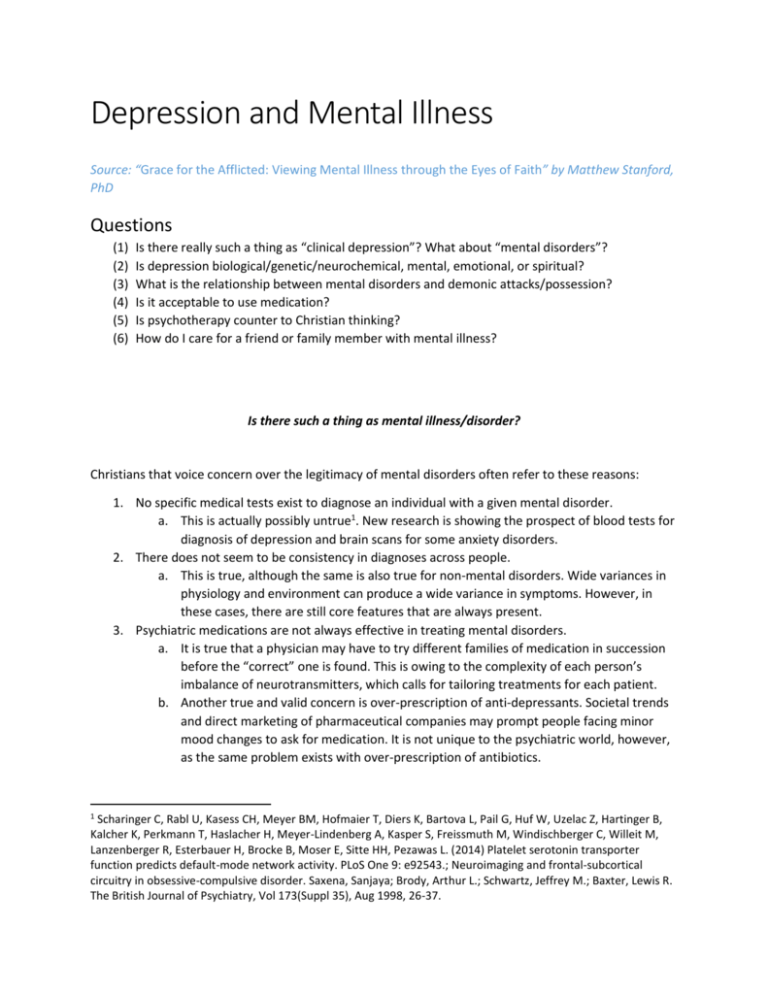
Depression and Mental Illness Source: “Grace for the Afflicted: Viewing Mental Illness through the Eyes of Faith” by Matthew Stanford, PhD Questions (1) (2) (3) (4) (5) (6) Is there really such a thing as “clinical depression”? What about “mental disorders”? Is depression biological/genetic/neurochemical, mental, emotional, or spiritual? What is the relationship between mental disorders and demonic attacks/possession? Is it acceptable to use medication? Is psychotherapy counter to Christian thinking? How do I care for a friend or family member with mental illness? Is there such a thing as mental illness/disorder? Christians that voice concern over the legitimacy of mental disorders often refer to these reasons: 1. No specific medical tests exist to diagnose an individual with a given mental disorder. a. This is actually possibly untrue1. New research is showing the prospect of blood tests for diagnosis of depression and brain scans for some anxiety disorders. 2. There does not seem to be consistency in diagnoses across people. a. This is true, although the same is also true for non-mental disorders. Wide variances in physiology and environment can produce a wide variance in symptoms. However, in these cases, there are still core features that are always present. 3. Psychiatric medications are not always effective in treating mental disorders. a. It is true that a physician may have to try different families of medication in succession before the “correct” one is found. This is owing to the complexity of each person’s imbalance of neurotransmitters, which calls for tailoring treatments for each patient. b. Another true and valid concern is over-prescription of anti-depressants. Societal trends and direct marketing of pharmaceutical companies may prompt people facing minor mood changes to ask for medication. It is not unique to the psychiatric world, however, as the same problem exists with over-prescription of antibiotics. 1 Scharinger C, Rabl U, Kasess CH, Meyer BM, Hofmaier T, Diers K, Bartova L, Pail G, Huf W, Uzelac Z, Hartinger B, Kalcher K, Perkmann T, Haslacher H, Meyer-Lindenberg A, Kasper S, Freissmuth M, Windischberger C, Willeit M, Lanzenberger R, Esterbauer H, Brocke B, Moser E, Sitte HH, Pezawas L. (2014) Platelet serotonin transporter function predicts default-mode network activity. PLoS One 9: e92543.; Neuroimaging and frontal-subcortical circuitry in obsessive-compulsive disorder. Saxena, Sanjaya; Brody, Arthur L.; Schwartz, Jeffrey M.; Baxter, Lewis R. The British Journal of Psychiatry, Vol 173(Suppl 35), Aug 1998, 26-37. 4. Not all abnormal behavior is the result of a brain disorder. a. This is very true, although this does not logically discount brain disease as a possible contributor to poor mental health. The selection of treatment options has much to do with origins of the problem (e.g. environmental, genetic, substance abuse, etc.) 5. Psychiatric and psychology are thought to legitimize sinful behavior. a. Again, this is a legitimate concern, although we must be careful to sin from illness. “It is certainly not a sin to be ill, even mentally ill. On the other hand, mental illness, whether it is a learned from abnormal thinking or a biological disorder, does not dismiss sinful behavior (Leviticus 5:17).”2 Is depression biological/genetic/neurochemical, mental, emotional, or spiritual? There can be components of each, which are all interrelated. We are all still experiencing consequences of the fall of humankind, which produces bodily death and decay, as well as internal turmoil (Romans 7:14-25). The proportion of each factor depends largely on the individual case. A person with a family history of clinical depression, a soldier suffering from PTSD, a person who lost a loved one, and a former substance abuser may all face battles concentrated on different fronts. What is the relationship between mental disorders and demonic attacks/possession? Scripture refers to 5 different means by which Satan and his demons attack humans: 1. Temptation a. The most prominent example is that of Jesus Himself (Matthew 4:1-11; Mark 1:12-13; Luke 4:1-13) b. Other mentions: 1 Corinthians 7:5; Ephesians 4:26-27 2. Deception a. To try and prevent people from seeing the truth of the gospel (2 Corinthians 4:4; Revelation 13:14) b. Through false teachers (Colossians 2:8; 1 Timothy 4:1) c. Even in their appearance (2 Corinthians 14-15) 3. Accusation a. In the story of Job (Job 1-2) b. In the vision of Joshua the high priest (Zechariah 3:1-2) c. Of all believers before God (Revelation 12:10) 2 Ch. 4: “A Cake of Figs” (Grace for the Afflicted: Viewing Mental Illness through the Eyes of Faith) 4. Infirmity a. Old Testament i. Job ii. Saul (1 Samuel 15:14, 1 Samuel 18:10-11) b. New Testament i. Healing miracles involving casting out of evil spirits 1. Healing of the Mute Man (Matthew 9:32-33) 2. Healing the Blind/Mute Man (Matthew 12:22; Luke 11:14) 3. Healing the Syrophoenician woman’s daughter (Matthew 15:22-28; Mark 7:25-30) 4. Healing of the boy suffering from seizures (Matthew 17:14-18; Mark 9:17-27; Luke 9:37-42) 5. Healing of the woman crippled for 18 years (Luke 13:10-16) ii. Paul’s “thorn in the flesh” (2 Corinthians 12:7-10) – unclear but widely accepted to be a physical malady resulting from demonic influence. c. One thing to note: out of all the healing miracles, the number of references involving demons is only a small percentage. 5. Possession a. At Capernaum (Mark 1:21-28; Luke 4:31-37) i. Note that the demon possession cases are distinguished as separate from the healing of those with physical ailments. b. Legion (Matthew 8:28-34; Mark 5:1-2; Luke 8:26-39) c. Failed attempt by the 7 sons of Sceva (Acts 19:13-16) In comparing the cases of infirmity and possession, there are some clear differences that separate demonic possession cases from illnesses from evil spirits. 1. 2. 3. 4. Inhabiting demons speak through the voice of the individual. The demon-possessed recognized Jesus as the Messiah and were afraid. Two of the possessed individuals displayed superhuman strength. Those with illnesses are described as being “healed” by Jesus, whereas other language is used in freeing those who were possessed (e.g. “casting out”). So are demons still active today? There are three schools of thought: 1. In Biblical times, medical understanding was not advanced enough to explain the behavior of disease and mental illness, and so symptoms were attributed to demonic presence. a. While these misattributions have happened (then and now), the problem with this argument is that it undermines Jesus’ integrity (and perhaps divinity) based on His statements and actions in the mentioned examples. 2. Incidences of demon possession and demonically-induced infirmity were limited to Biblical times and the ministry of Jesus and His apostles. a. There are no verses explicitly stating this or the contrary, but the New Testament suggests Satan’s continued antagonization of the church (Ephesians 6:11-12, 1 Peter 5:8). In addition, the writings of early church fathers (Ignatius, Justin Martyr, Tertullian, Origen) continue to mention instances of demonic attacks. 3. Demonic infirmity and possession still occur today as often as they did in Biblical times. a. We have to keep in mind that the Gospels are selected events in Jesus’ life, and by divine inspiration the authors have highlighted the more remarkable events. This may make it seem to the modern reader that exorcisms were more common than they actually were. So what about mental illness? “All mental disorders result from the interaction of biological and environmental factors. We have a biology that is broken because of sin, and we live in an environment infected by the evil one. From this perspective the demonic is involved in all illness, including mental illness, at some level; and the reality may be why the Gospel authors so blurred the lines between “natural” illness and demonic infirmity.”3 Is it acceptable to use medication? Absolutely. This is not to say every single case demands medication, but to discount the option altogether is arbitrary, illogical, and not prescribed at all in God’s Word. (1) Medication to alleviate other disorders, even other brain-based disorders such as Alzheimer’s disease, are not forbidden or discouraged. So why does the stigma exist for depression and other disorders? (2) An accurate statistic for suicide rates of depression sufferers is difficult to obtain, but it is accepted that the rate of suicide attempts and deaths by suicide is alarming. Telling church members they cannot take medication may sentence some of them to death. (3) Saying that the use of medication is an affront to the sovereignty of God, because it means you do not trust the Lord to heal you, is a fallacy. a. To assume that God cannot heal through physical means is itself an assertion by which you place limitations on what God can do and can’t do. b. Medication and prayer are not mutually exclusive, and serve different functions. c. There is precedence for medical remedy accompanying God’s healing. (2 Kings 20:1-7, Mark 6:13) 3 Ch. 2: “The Adversary” (Grace for the Afflicted: Viewing Mental Illness through the Eyes of Faith) Is psychotherapy counter to Christian thinking? Because of the prominence of humanism in the history of psychoanalysis, Christians may fear that a clinical psychologist might lead them or their loved ones astray - by downplaying God and spirituality, or by validating sin, etc. Indeed, not all psychologists and therapists are alike, but the better ones will understand Christian (or other religious) patients as placing a great value in their faith and will treat it as a component of his/her treatment. “As psychologists, we walk side by side with our clients as they find their path. We are not supposed to grab their hand and take the lead…” -Paula O’Sullivan Chaffee, PhD, letter to the editor, Monitor on Psychology 36, no. 9 (October 2005) One common approach that Christian and secular therapists can both heartily support is cognitive behavioral therapy. The premise of this approach is to help the patient identify and eliminate false negative beliefs and thought patterns, from which negative behaviors result. How do I care for someone with mental illness? The specific care will obviously depend on the specific illness, but these are some commonalities. (1) Mercy, not pity. And certainly not fear. a. Make allowances for them if they cannot fulfill their obligations, and offer tentative and smaller steps they can take, in exchange. Turning down their participation entirely may make them feel disabled, useless, and excluded. b. For people struggling with mood disorders, concentration and memory can be an issue. Brief encouragements and single verses are much more effective. c. For people with more symptomatic disorders such as schizophrenia, know that (unlike what is portrayed in the media), only a very small number actually exhibit violent behavior. i. If they are not under medical care, get them medical help as soon as possible. ii. If they indicate intention to harm themselves or others, do not hesitate to call 911 for help. (2) Be there and don’t be there. a. It may be frustrating to determine how closely the person will allow you to interact with him or her. i. Respect the person’s space, but make it known you are available, and that you love them. (3) Hope a. Do not offer false hope (“the problem will go away”) but help them understand that it is possible to live with this. i. Help divert the person’s focus away from what he/she thinks he/she can not do. b. If the person perceives that God has abandoned them, or will not forgive them, you and he/she should know that the feeling is common (and mentioned frequently in Psalms). Don’t be compelled convince them right then and there that the idea is untrue (see #5c). c. Be aware: stories of other people becoming well may have an adverse effect depending on the person. They may resent that others have gotten better while they remain unwell. (4) Redefine victories, and celebrate them a. For someone with depression, just getting out of the bed in the morning can be a serious obstacle. Don’t see that as trivial – let them understand that these are victories they can claim in the name of Christ, against the illness and against the works of Satan. (5) You don’t need to be a doctor or a pastor. God put you in a role as a friend/family member. a. Your job is not to “fix” the person. Only God can bring about true healing, as He chooses, but He invites you to be a representative of care as part of it. b. If you are talkative and/or if your gift is preaching, learn to hold back and allow there to be dialogue. Even allow silence. c. Your job is not to be God’s advocate or PR person. d. Note: Particularly with depression, if treatment improves his/her condition, he/she may be tempted to stop taking medication/treatment. This is common and dangerous and you should call attention to it. (6) This is not a specialized mission. a. If you take the long view, this is not anything outside of what we are already called to do. Every person has different weaknesses, some of them more socially acceptable than others. ALL of us are in need of grace. But the moment we begin to draw lines separating us of which God makes no distinction, we lose.

